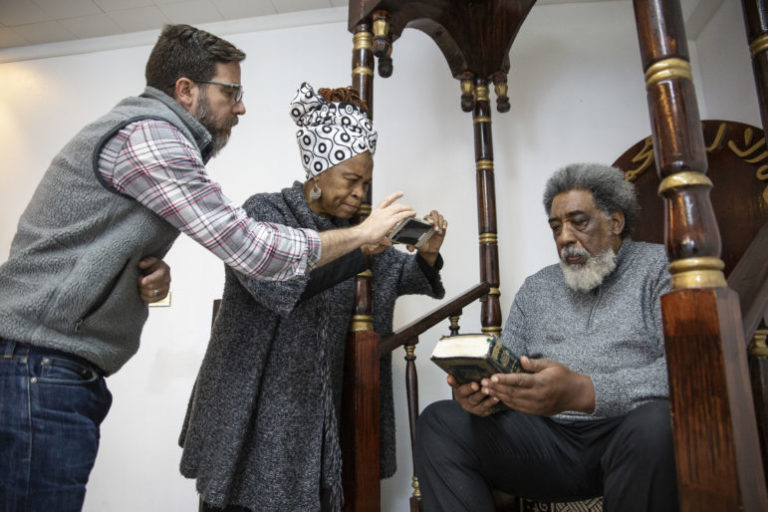
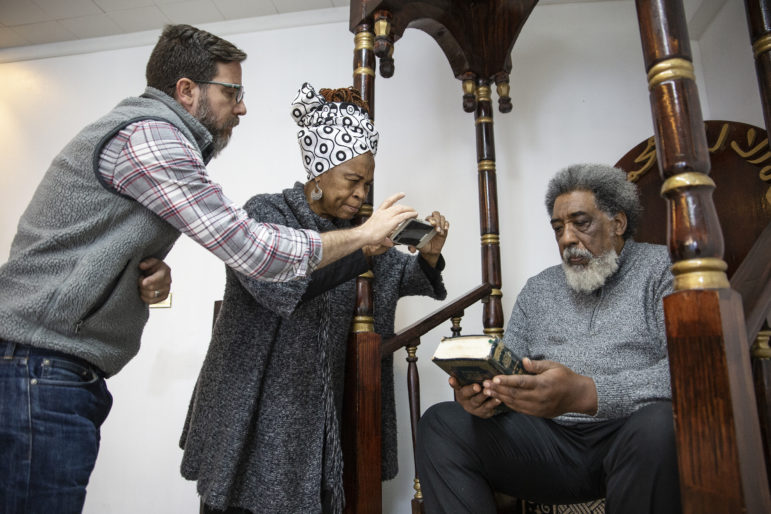
Eric J. Shelton/Mississippi Today
Chandler Griffin, co-founder of Blue Magnolia Films, left, helps Okolo Rashid gather footage for a documentary about Islamic culture, December 11, 2019.
Late morning edges into afternoon in the Community Room at the Arts Center of Mississippi in Jackson, and the stories tumble out — of the front line in Mississippi’s civil rights struggle, of a sharecroppers’ daughter determined to get an education, of the degrading checkpoints in occupied Gaza a Palestinian family’s young son never forgot.
Founders and staff of the International Museum of Muslim Cultures gather for a workshop with Blue Magnolia Films, the pioneering Mississippi-based documentary film company that spotlights bright spots in the state and forges community connection through storytelling.
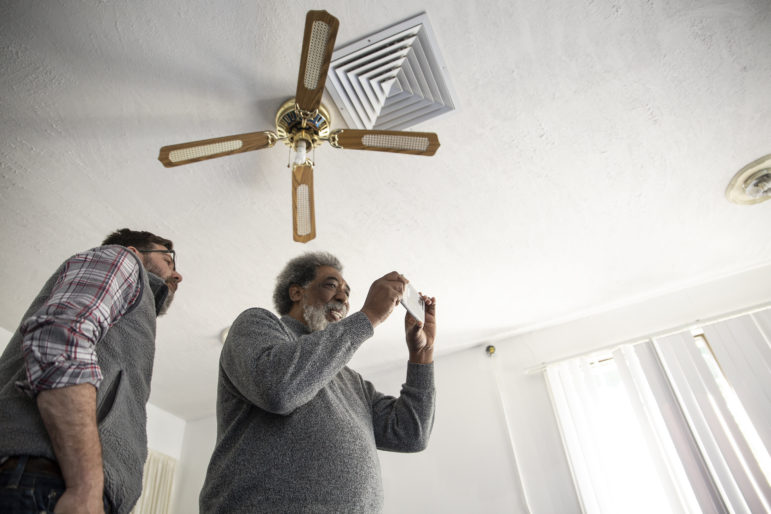
Eric J. Shelton/Mississippi Today
Chandler Griffin, co-founder of Blue Magnolia Films, left, looks on as Sababu Rashid films content for a documentary about Islamic culture at Muhammad Masjid in Jackson, Miss., December 11, 2019.
Aiming to take the museum from a local/regional presence to a national profile, they see founders’ succinct photo documentaries as a key piece in that goal. “We have a just story to tell, and people can connect with it from a human perspective. We just need to tell it in a better way,” says museum founder Emad Al-Turk.
Blue Magnolia Films’ way zeroes in on the “why” thread, helping individuals craft and tell their unique stories in an engaging way, with a purpose and universal resonance.
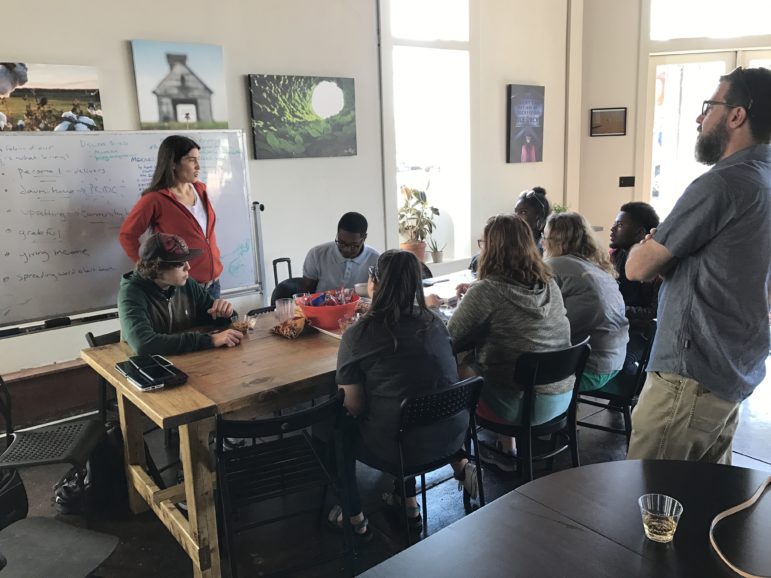
Aallyah Wright, Mississippi Today
Alison Fast and Chandler Griffin of Blue Magnolia Films
Blue Magnolia Films was founded by Mississippi native and documentary filmmaker Chandler Griffin and his wife, Peabody Award-winning filmmaker Alison Fast, in 2013. Their project for Mississippi’s bicentennial in 2017 — short documentary films highlighting cool projects and creatives, many in small towns around the state — introduced not only the film’s author/subjects, but also, for many here, a powerful and positive method of storytelling.
Blue Magnolia Films has done about 160 workshops in 24 countries, including across the Middle East and Africa, helping people apply storytelling to goals in health, development, democracy building and human rights. “This is very much our specialty,” Griffin says. “I’m a fifth-generation Mississippian, so where else would we be doing this? We’ve really been around the planet and very much are taking everything we’ve learned and applying it now to Mississippi.” Work with Volunteer Mississippi highlighted stories of service; workshops with Selma, Alabama, showcased stories of revitalization to mark Alabama’s bicentennial and Selma’s 200th anniversary.
The Community Foundation for Mississippi, now in its 25th anniversary year, is working with Blue Magnolia Films on a suite of photo documentaries to get at the heart of why people do the work they do, to change the communities they live in. Jane Alexander, foundation executive director and long a fan of Blue Magnolia Films’ work in the state, was sold on the accessible, cost-effective, “extraordinarily personal” workshops. Resulting stories connect with people in a way that numbers and annual reports can’t.
Alexander wanted Blue Magnolia Films’ iPhone photo/personal narrative approach for stories of individuals less directly involved with the Community Foundation, but whose admirable work touched tandem chords. “Their level of commitment to community is a story that’s worth lifting up.” Rich, layered narratives share stories of risk takers and leaders who put some part of their lives on the line for something important, such as Jackson Public Schools Chief of Staff Michael Cormack. He left the Barksdale Reading Institute and uprooted his family to take up that mantle; he highlights the possibilities ahead in his photo story, “Excellence for All.”
Alexander hopes to re-ignite a community spirit that was a matter of course in her parents’ generation, that is perhaps less so in current times. “What we’ve lost is this feeling that we have a shared responsibility to build our own places and make those places good to live in.”
Photo documentaries by architect Buddy Faulkner, restaurateur and Extra Table founder Robert St. John and Cormack will soon be joined by another three — by Mississippi Alliance of Nonprofits and Philanthropy leader Sammy Moon, by Winter Institute Youth Engagement Coordinator Von Gordon, by JPS Partners in Education Director Thea Faulkner, and by Alexander. That’s it for this year, but Alexander’s plan extends to future workshops — annually, the hope is — to highlight constituents’ stories.
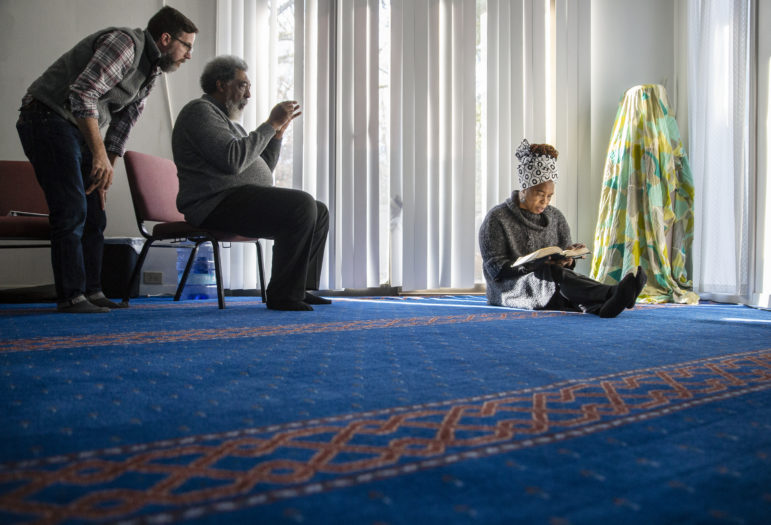
Eric J. Shelton/Mississippi Today
Chandler Griffin, co-founder of Blue Magnolia Films, left, assists Sababu Rashid as he films his wife, Okolo Rashid, for a documentary at Masjid Muhammad in Jackson, Miss., December 11, 2019.
“It really leads to a very deep dive into your own life and your own thoughts and philosophy,” Alexander says, likening “dig deeper” talks with Fast to “just like those late-night college conversations we used to get into at 2 o’clock in the morning on a Saturday night after too many beers at CS’s. … like when you have the luxury to really think about the ‘why’ of your life, and not just the ‘what’ of your life.”
As Fast says, “The more personal your story is, the more personable, the more vulnerable, the more honest, open, sincere, the more universal it becomes.”
With this process, “There’s a format, but there’s not a formula. It is about taking a journey, and each person will take a journey, using photography and narrative — oral history,” Fast says. “Each person has different touchstones.” Values-based and place-based stories emerge through the intense and organic workshop, over days of mentorship, reflection and deep conversation, over thousands of photographs, over script revisions and recordings to get at the heart of each individual’s backstory, involvement, hopes and purpose.
“We help people to connect their own stories to where they live, and then to those they serve. … It really is not only telling our stories, but putting our stories in service of our community, and the values that we want to grow,” Fast says.
In the finished documentary, stories unfold in the author’s voice, over dozens of photographs (often by that person), and take viewers along, connecting — human to human — in a meaningful way. Stories emerge from the inside, out, that’s especially important in Mississippi, where stories are often underrepresented or misrepresented, Fast says.
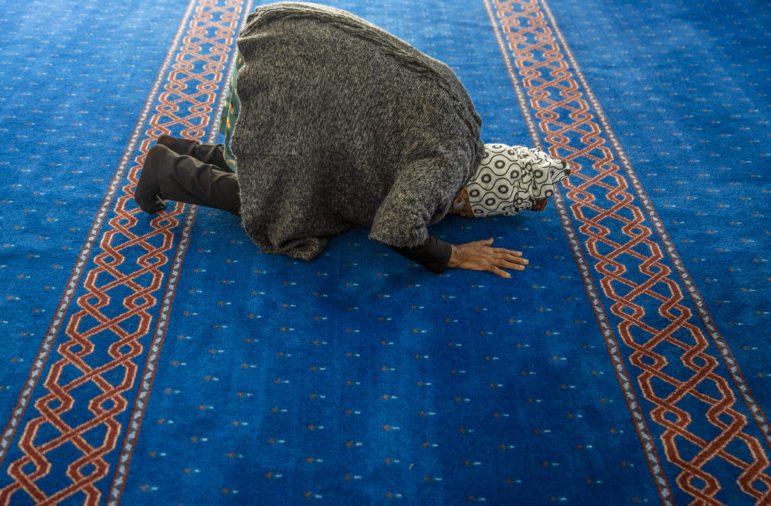
Eric J. Shelton/Mississippi Today, Report For America
At a time when Muslims are under attack worldwide and false narratives abound, “Our work is even more important, to actually correct the stereotypical depictions of Muslims and Islam,” the International Museum of Muslim Culture’s Al-Turk says. “Our faith guides us to do this in a respectful way … to present the facts about our faith to the American public, and if people know what Islam is about, what the message of peace and coexistence and love and care that Islam promotes us to do, then the narrative will change over time.”
Photo stories by museum founding families Okolo and Sababu Rashid and Emad Al-Turk (with another by his wife, Karen, expected later) will be used as the museum’s exhibition “Muslims with Christians & Jews: Covenants & Coexistence” begins touring nationally, sharing commonalities among the faith traditions and building bridges of understanding.
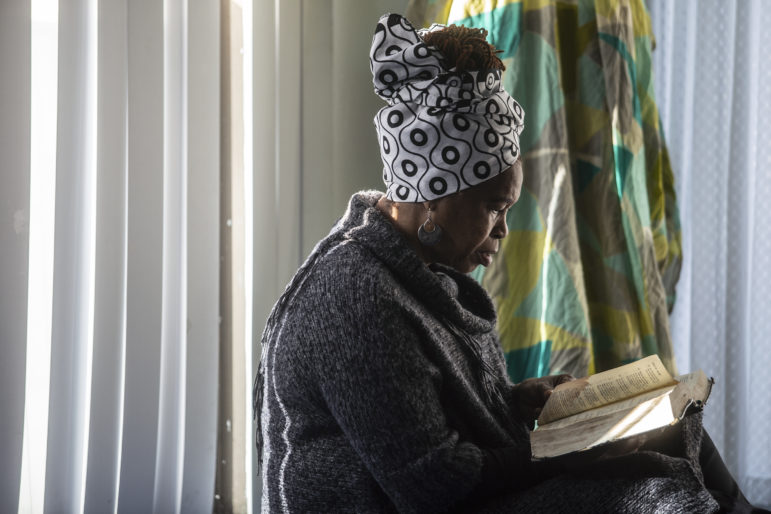
Eric J. Shelton/Mississippi Today
Okolo Rashid reads the Koran while being filmed for a documentary with Blue Magnolia Films at Masjid Muhammad in Jackson, Miss., December 11, 2019. Blue Magnolia Films assisted members of the Islamic community as they created a documentary about Islamic culture in Mississippi.
“We always say, ‘Tell the kind of stories you want more of,’” Fast says. People can get stuck in a narrative, or with a naysaying approach about what’s not working.
“There always is a story of what is working, and if we want more of that story, we need to tell that story, make it visible. And, the best people to tell that story — the ones who can authenticate it, the ones who can voice it — are the ones who are living it.”
The post Mississippi-based documentary film company forges community connection through storytelling appeared first on Mississippi Today.
- Scientists: Genetic analysis could speed restoration of American chestnut trees, from Maine to Mississippi - February 14, 2026
- NAACP threatens to sue Elon Musk’s xAI over pollution in Mississippi - February 13, 2026
- School consolidation bill dies without a vote in Mississippi Senate - February 13, 2026